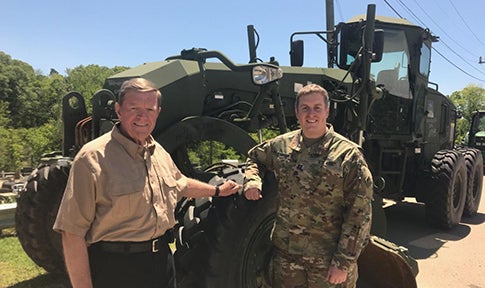ERDC engineer awarded for his innovation
Published 8:00 pm Sunday, April 22, 2018

- Cpt. Daniel Harder, right, followed in the footsteps of his dad Bob Harder, left, and joined the Army Corp of Engineers. Danile Harder works as a research civil engineer at the Army Engineer Research and Development Center in Vicksburg. (Robert Dedeaux/ERDC Public Affairs)
For Cpt. Daniel Harder, the choice of what he was going to do when he grew-up was an easy one.
His dad had spent 20 years working for the Army Corps of Engineers as a civil engineer including nine years on active duty and 11 in the reserves and Harder’s older brother was an engineer in the Air Force.
“Growing-up, I thought that was what people did,” Harder said. “People would ask what are you going to do and I would say I am going to go to college, become an engineer and join the Army. It was way down the road where I realize I guess I could have done something else.”
Early in his career, Harder’s path even mirrored his dad’s as they both spent time stationed in Germany as part of combat engineer units. Bob Harder, Daniel’s dad, was station in Germany for three years at the height of the Cold War where he was tasked with helping to slow down the East German army.
“When I was in Germany, we had a combat mission, which was right on the East German border,” Bob Harder said. “The civil engineering expertise was only needed so we could figure out where there was a bridge, where we needed to put explosives to blow it up. On the combat side of Corps of Engineers we just like to blow things up.”
Years later, Daniel Harder was stationed in Germany at the start of his career before being deployed to Afghanistan as part of a combat engineer unit clearing roadways. He then spent time in Korea before moving to Vicksburg to work at the Army Corps of Engineers Research and Development Center in January 2016.
As someone who has spent time deployed to a war zone, he said he uses that experience to work with his fellow researches to determine which projects are most important and to encourage the civilian employees of the impact they are having keeping soldiers safe.
“It is good to have that experience, because you come here and everyone is focused and driven and it’s great, but it is nice to be able to bring in that input and see these are the things that really matter or encourage them that I was down range and saw the impact of this,” Daniel Harder said.
At ERDC, Daniel Harder works with ACE mats, which are deployed to create roads and helicopter landing spots in areas with weak soil, and with airfield repairs.
For his work with the ACE mats Daniel Harder was recently recognized with the Major General Harold J. Greene Award for Innovation, a national award that is given out annually to one civilian, one member of the Army and one group for innovation in Army science.
Daniel Harder’s project involved redesigning the heads of the anchors used to secure the mats to give them a lower profile and keep them from damaging passing vehicles.
“The existing design had a big circle with a hexagonal nut on it. When you drive over it, it cuts up little rubber bits so it caused a lot of damage and moved the mat around,” Daniel Harder said. “The new one trimmed it down a lot thinner so you could drive over it and it wouldn’t damage your tire and if you drove over it with a track, you weren’t hitting the side of the screw and moving it.”
He said it was, “pretty exciting” to win the award, and having spent time in the Corps himself, Bob Harder said he was “triple proud” of his son and jealous of where his career has taken him.
“I was thinking it was an ERDC wide thing and ERDC gave him an award like a thumps up, good job,” Bob Harder said. “Then when I came here to visit, we’d be walking around and people would be like, ‘congratulations on your award. Good job.’ Then he explained it is an annual, national award. To me that was extra proud. It was national, not just local and it was for innovation.”





